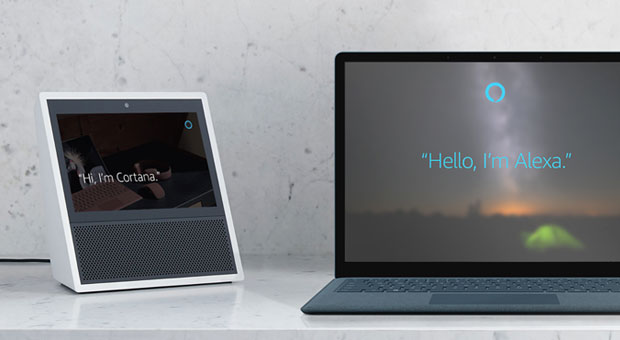Microsoft and Amazon this week announced a deal that will let their voice-controlled digital assistants, Cortana and Alexa, engage in cross-platform communications, a move that could expand radically both companies’ use of artificial intelligence.
Microsoft customers will be able to access Alexa voice commands by saying “Cortana, open Alexa” on any device that supports Cortana, which is available on millions of desktops, laptops, tablets and other devices.
Under the agreement, Microsoft customers first will be able to access Alexa via Cortana on Windows PCs, and later on Android and iOS devices, noted Andrew Shuman, corporate vice president, Cortana Engineering.
The Amazon products are integrated with a growing ecosystem of smart home devices, such as automated security systems, lights, window blinds and more.
Users of Alexa-controlled devices — the Amazon Echo, Dot and other smart speakers, as well as Amazon Fire tablets, Amazon Fire TV and Amazon Kindle tablets — will be able to access appointments, reminders, email and other functionality by saying “Alexa, open Cortana.”
“There are going to be multiple, successful intelligent agents, each with access to different sets of data and with different specialized skill areas,” said Amazon CEO Jeff Bezos.
Mutual Interest
Amazon and Microsoft have an interest in developing the ability to communicate with each other, because neither company has enough presence in the mobile space to stand alone, observed Mark Beccue, principal analyst at Tractica.
“Neither MIcrosoft nor Amazon have the market penetration in mobile that Apple and Google do,” he told TechNewsWorld. “Their virtual assistants are not very multimodal yet. Maybe they feel stronger together.”
The companies each offer their own set of core competencies, said Adam Marchick, CEO of VoiceLabs, as Microsoft is stronger in productivity and search, and Amazon is stronger in e-commerce and has a vast ecosystem of skill applications, including many related to smart home technologies.
“There isn’t enough of a competitive environment right now to feel like someone is taking the other one’s cheese,” Marchick told TechNewsWorld.
Still, each company will need to work on its respective voice assistant technologies to make sure which system is best suited for specific type of queries, said Paul Teich, principal analyst at Tirias Research.
“This is going to require deploying more AI in the front-end interaction with people, so it will raise the cost of interaction,” he told TechNewsWorld.
Smart Speakers
Amazon this spring had an installed base of about 11 million people using smart speakers like Amazon Echo and Dot, using voice commands to shop on Amazon or control smart home gadgets, according to data from Consumer Intelligence Research Partners.
“We think customers will like this because Microsoft has a lot of vertical data sets that are unique to them,” said Amazon spokesperson Dawn Brun. “You can imagine there are a lot of work use cases if your company uses Outlook.”
The commands to control the devices will be the same for Cortana as they are for Alexa, she told TechNewsWorld.
Further, earlier reports that Amazon would not preclude future agreements with Apple or Google regarding their voice-controlled AI technologies, Siri or Google Assistant, were accurate, Brun confirmed.
Cortana is available on 145 million devices, including computers and mobile devices, according to Microsoft.
Microsoft later this fall plans to launch its own smart speaker, Invoke, under a partnership with Harman Kardon. Several other new speakers are expected, including Apple’s HomePod, which is scheduled to launch in December.
The new entrants will face stiff competition not only from Amazon’s Echo line, but also from Google’s Home, which so far is Amazon’s only significant rival in the smart speaker market.






















































